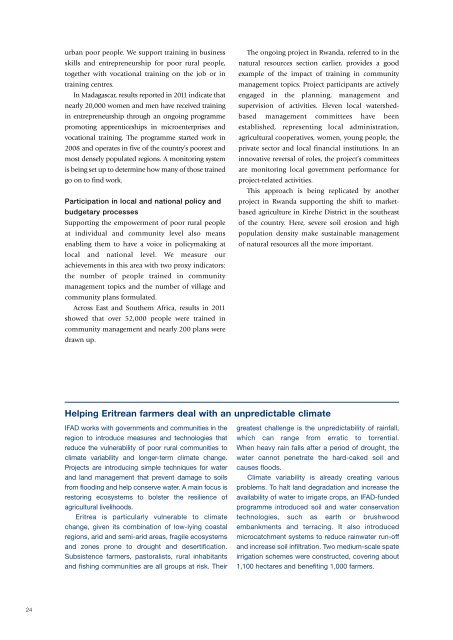ANNUAL REPORT 2011 - IFAD
ANNUAL REPORT 2011 - IFAD
ANNUAL REPORT 2011 - IFAD
You also want an ePaper? Increase the reach of your titles
YUMPU automatically turns print PDFs into web optimized ePapers that Google loves.
24<br />
urban poor people. We support training in business<br />
skills and entrepreneurship for poor rural people,<br />
together with vocational training on the job or in<br />
training centres.<br />
In Madagascar, results reported in <strong>2011</strong> indicate that<br />
nearly 20,000 women and men have received training<br />
in entrepreneurship through an ongoing programme<br />
promoting apprenticeships in microenterprises and<br />
vocational training. The programme started work in<br />
2008 and operates in five of the country’s poorest and<br />
most densely populated regions. A monitoring system<br />
is being set up to determine how many of those trained<br />
go on to find work.<br />
Participation in local and national policy and<br />
budgetary processes<br />
Supporting the empowerment of poor rural people<br />
at individual and community level also means<br />
enabling them to have a voice in policymaking at<br />
local and national level. We measure our<br />
achievements in this area with two proxy indicators:<br />
the number of people trained in community<br />
management topics and the number of village and<br />
community plans formulated.<br />
Across East and Southern Africa, results in <strong>2011</strong><br />
showed that over 52,000 people were trained in<br />
community management and nearly 200 plans were<br />
drawn up.<br />
<strong>IFAD</strong> works with governments and communities in the<br />
region to introduce measures and technologies that<br />
reduce the vulnerability of poor rural communities to<br />
climate variability and longer-term climate change.<br />
Projects are introducing simple techniques for water<br />
and land management that prevent damage to soils<br />
from flooding and help conserve water. A main focus is<br />
restoring ecosystems to bolster the resilience of<br />
agricultural livelihoods.<br />
Eritrea is particularly vulnerable to climate<br />
change, given its combination of low-lying coastal<br />
regions, arid and semi-arid areas, fragile ecosystems<br />
and zones prone to drought and desertification.<br />
Subsistence farmers, pastoralists, rural inhabitants<br />
and fishing communities are all groups at risk. Their<br />
The ongoing project in Rwanda, referred to in the<br />
natural resources section earlier, provides a good<br />
example of the impact of training in community<br />
management topics. Project participants are actively<br />
engaged in the planning, management and<br />
supervision of activities. Eleven local watershedbased<br />
management committees have been<br />
established, representing local administration,<br />
agricultural cooperatives, women, young people, the<br />
private sector and local financial institutions. In an<br />
innovative reversal of roles, the project’s committees<br />
are monitoring local government performance for<br />
project-related activities.<br />
This approach is being replicated by another<br />
project in Rwanda supporting the shift to marketbased<br />
agriculture in Kirehe District in the southeast<br />
of the country. Here, severe soil erosion and high<br />
population density make sustainable management<br />
of natural resources all the more important.<br />
Helping Eritrean farmers deal with an unpredictable climate<br />
greatest challenge is the unpredictability of rainfall,<br />
which can range from erratic to torrential.<br />
When heavy rain falls after a period of drought, the<br />
water cannot penetrate the hard-caked soil and<br />
causes floods.<br />
Climate variability is already creating various<br />
problems. To halt land degradation and increase the<br />
availability of water to irrigate crops, an <strong>IFAD</strong>-funded<br />
programme introduced soil and water conservation<br />
technologies, such as earth or brushwood<br />
embankments and terracing. It also introduced<br />
microcatchment systems to reduce rainwater run-off<br />
and increase soil infiltration. Two medium-scale spate<br />
irrigation schemes were constructed, covering about<br />
1,100 hectares and benefiting 1,000 farmers.

















